Foreign Policy and National Security Challenges Facing the Second Obama Administration
Karen DeYoung, The Washington Post
David Sanger, The New York Times
Photos | Transcript | Video
Washington, DC—On January 28, 2013, journalists Karen DeYoung, Senior National Security Correspondent and an Associate Editor of The Washington Post, and David Sanger, Chief Washington Correspondent for The New York Times and author of Confront and Conceal: Obama's Secret Wars and Surprising Use of American Power (2012), addressed WFPG members and guests at a Beyond the Headlines event on Foreign Policy and National Security Challenges Facing the Second Obama Administration. The speakers discussed issues including unrest in Syria, transition in Afghanistan, threats from Iran and North Korea, and the situation in Mali. The program was moderated by WFPG President Patricia Ellis and was co-sponsored by NYU Washington, DC.
DeYoung began her remarks discussing the seemingly amicable relationship between President Obama and Hillary Clinton and how their like-minded thinking on foreign policy issues shaped much of Obama’s first term. She spoke about the transition of US troops out of Afghanistan, stating that the goal of the US now is to leave as quickly and cleanly as possible with a small group of counterterrorist forces left behind to maintain security in the region. DeYoung also suggested that the problems in Libya and Mali are only the beginning of many conflicts to come in North Africa as Islamist-extremist groups continue to take hold and garner local supporters to their cause. She said that this will be one of the greatest challenges for Obama’s second administration. DeYoung also explained why the US was so hesitant to become involved in the situation in Syria. She stated that after two lengthy wars in Afghanistan and Iraq, the American public was not interested in sending more troops overseas and spending more tax dollars to fund another war.
Sanger spoke about President Obama’s approach to foreign policy issues and how they differed from his predecessor, George W. Bush’s methods. Obama exercised caution when deciding where the US should intervene and where to step back and allow another country to take the lead, as in Mali. Like DeYoung, Sanger stressed the influence of the wars in Afghanistan and Iraq as shaping the foreign policy doctrine of the Obama administration. Sanger spoke at length on this administration’s use of drones and cyber security as offensive weapons against countries like Pakistan, Iran, Libya, and others. The targeted killing programs have vastly expanded under the Obama administration and Sanger believes that Obama will continue to use this light footprint approach, using drones in place of troops on the ground. He also mentioned the relationship between the US and China, commenting that the second term will prove to be a delicate balance between pivoting our diplomatic attention to China and the rest of Asia as turmoil continues to intensify in the Middle East and North Africa.
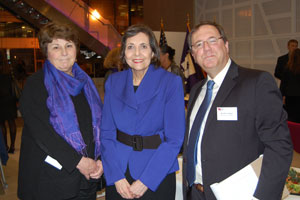 |
 |
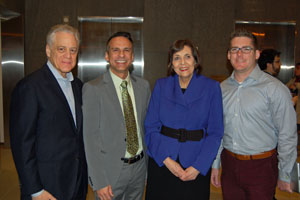 |
Speakers Karen DeYoung and David E. Sanger
with WFPG President Patricia Ellis
|
|
Patricia Ellis with Ron Abramson, Michael Ulrich,
and Tom McIntyre of NYU Washington DC
|
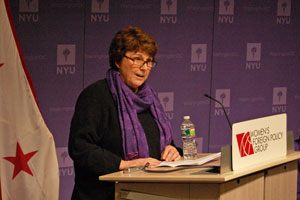 |
 |
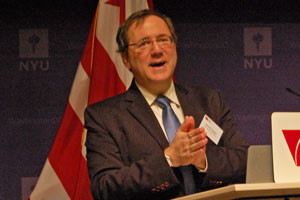 |
Karen DeYoung of The Washington Post
makes opening remarks
|
|
David Sanger of The New York Times
addresses WFPG Board Members and guests
|
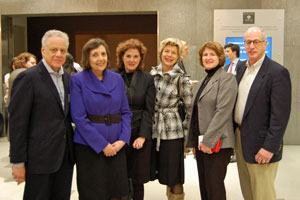 |
 |
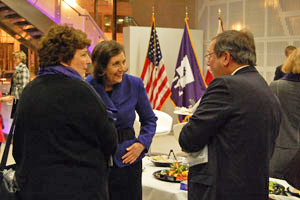 |
Ron Abramson with WFPG Board Members Donna
Constantinople, Diana Negoponte,
and Theresa Loar
|
|
Karen DeYoung, Patricia Ellis and David Sanger
at the reception
|
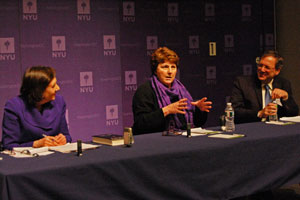 |
 |
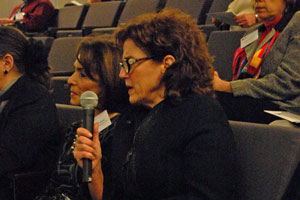 |
| |
|
|
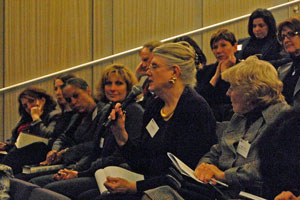 |
 |
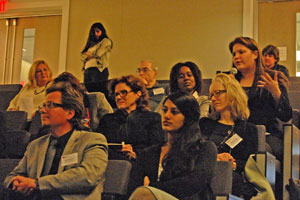 |
| |
|
|
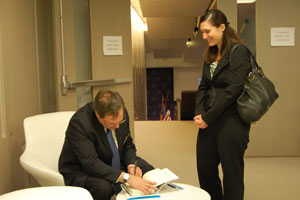 |
 |
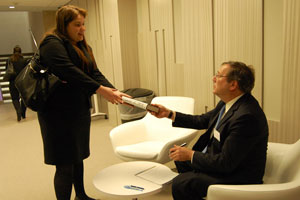 |
| |
|
|